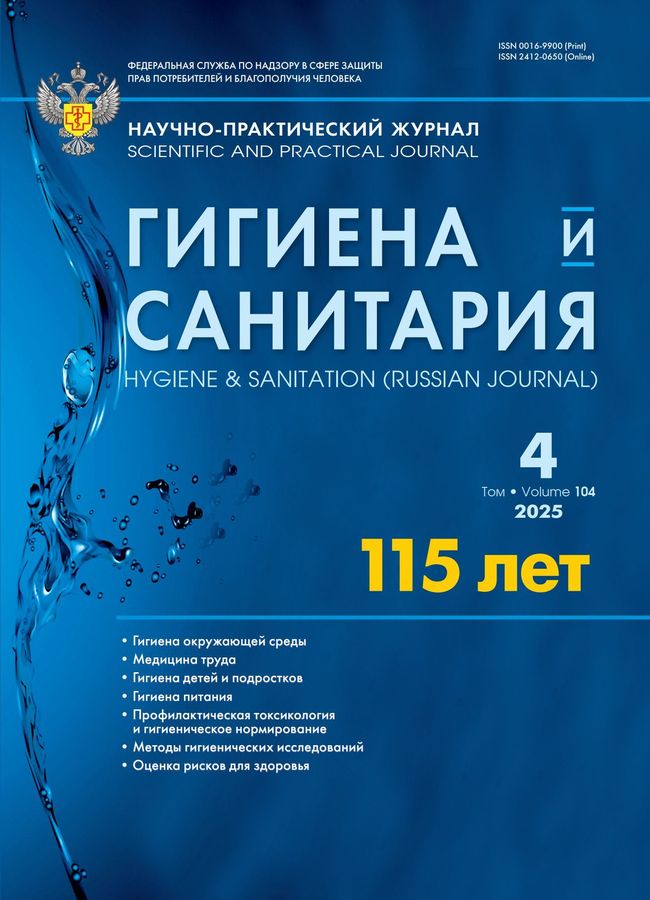Hygienic principles of working conditions in modern livestock complexes
- Authors: Ibrohimov K.I.1
-
Affiliations:
- Bukhara State Medical Institute
- Issue: Vol 104, No 4 (2025)
- Pages: 409-414
- Section: OCCUPATIONAL HEALTH
- Published: 15.12.2025
- URL: https://freezetech.ru/0016-9900/article/view/680590
- DOI: https://doi.org/10.47470/0016-9900-2025-104-4-409-414
- EDN: https://elibrary.ru/hvivda
- ID: 680590
Cite item
Abstract
Introduction. This study discusses the importance of adhering to hygienic principles to ensure comfortable and safe working conditions for employees in modern livestock complexes. To achieve high productivity in animal husbandry, it is essential that the working environment meets sanitary and hygienic requirements.Materials and Methods. The hygienic assessment of working conditions for employees in modern livestock complexes and the development of measures to improve the working process utilized hygienic, sanitary-chemical, physiological, and statistical research methods.Results. Working conditions in modern livestock complexes are characterized by numerous factors that affect the health of workers. Employment in this field requires compliance with various sanitary and hygienic norms. Any deviation from these requirements can lead to the development of occupational diseases or a decrease in labor productivity. Below, the working conditions in animal husbandry and the results of their assessment based on hygienic principles are described.Conclusion. Strict adherence to sanitary and hygienic regulations is of paramount importance for protecting the health of workers in livestock complexes. Preventing harmful factors at early stages and reducing them to a minimal level can decrease morbidity and improve working conditions. The organization of medical examinations and regular training for employees enhances the effectiveness of preventive measures.Compliance with ethical standards. The study does not require the submission of the conclusion of the biomedical ethics committee or other documents.Conflict of interest. I declare that I have no explicit or potential conflicts of interest related to the publication of this article.Acknowledgment. In this study, the results and analyses obtained were fully prepared by the authors and were conducted independently. All external influences and financial interests were excluded, ensuring the objectivity of the research. All stages of the study, including data collection and analysis, were carried out based on a clear and precise methodological approach. We express our sincere gratitude to all individuals and organizations that supported the preparation of this study. Special thanks go to the management and staff of the livestock complexes involved, whose cooperation was invaluable during data collection and observations. Additionally, we acknowledge the contributions of our colleagues and experts who provided insightful feedback and guidance throughout the research process.Received: October 10, 2024 / Revised: October 29, 2024 / Accepted: December 3, 2024 / Published: April 30.2025
References
- Mirmohammadi S., Khanjani N., Nazarkhani F., Abediankenari S., Yazdani J., Tilaki R.A.D. The effect of noise and dust exposure on oxidative stress among livestock and poultry feed industry workers. Toxicol. Ind. Health. 2020; 36(11): 908–15. https://doi.org/10.1177/0748233720962253
- Осипов С.А., Малышева И.Ю., Берхеева З.М., Трофимова М.В., Гиниятова А.М., Сафина К.Р. Условия труда и профессиональная заболеваемость работников сельского хозяйства Республики Татарстан. Вестник современной клинической медицины. 2016; 9(5): 29–34. https://elibrary.ru/wtpbrf
- Ibrohimov K.I. Hygienic evaluation and improvement of working conditions of employees of modern animal husbandry complexes. Am. J. Med. Med. Sci. 2023; 13(12): 1964–70. https://doi.org/10.5923/j.ajmms.20231312.31
- Ibrohimov K.I. Hygienic basics of working conditions in modern animal husbandry complexes. Tibbiyotda yangi kun (New Day in Medicine). 2023; (6): 14–9.
- Lovarelli D., Bacenetti J., Guarino M. A review on dairy cattle farming: Is precision livestock farming the compromise for an environmental, economic and social sustainable production? J. Clean. Prod. 2020; 262: 121409. https://doi.org/10.1016/j.jclepro.2020.121409
- Панкивский Ю.И., Ошуркевич-Панкивская О.Е. Оценка влияния животноводческого комплекса ООО «БАРКОМ» на атмосферный воздух. В кн.: Материалы Международной научно-практической конференции «Проблемы природоохранной организации ландшафтов». Новочеркасск; 2018: 125–30. https://elibrary.ru/uceedw
- Guarrasi J., Trask C., Kirychuk S. A systematic review of occupational exposure to hydrogen sulfide in livestock operations. J. Agromedicine. 2015; 20(2): 225–36. https://doi.org/10.1080/1059924X.2015.1009667
- Gutema F.D., Agga G.E., Abdi R.D., Jufare A., Duchateau L., De Zutter L., et al. Assessment of hygienic practices in abattoirs and retail stores in Bishoftu, Ethiopia: implications for public health. Int. J. Environ. Res. Public Health. 2021; 18(5): 2729. https://doi.org/10.3390/ijerph18052729
- Попова А.Ю. Проблемы и тенденции профессиональной заболеваемости работников сельского хозяйства Российской Федерации. Здоровье населения и среда обитания – ЗНиСО. 2016; (9): 4–9. https://elibrary.ru/wmdift
- Масягутова Л.М., Гизатуллина Л.Г., Гайнуллина М.К., Власова Н.В., Рафикова Л.А. Видовой состав отдельных штаммов микроорганизмов при развитии болезней верхних дыхательных путей у работников сельскохозяйственного производства. Гигиена и санитария. 2021; 100(11): 1261–66. https://doi.org/10.47470/0016-9900-2021-100-11-1261-1266 https://elibrary.ru/ecmdbj
- Butore J. Study of the impact of concrete barn on cattle breeding in permanent housing: case of Gitaramuka commune, province of Karusi (Burundi). Polythematic Online Scientific Journal Of Kuban State Agrarian University. 2021; (170): 23–32. https://doi.org/10.21515/1990-4665-170-002 https://elibrary.ru/fnwiws
- Li H. Mid-term report: Complex ventilation and micro-environmental control in livestock housing. Tech. Rep. Civil Archit. Eng. 2015; 3(2): 1–29. https://doi.org/10.7146/cae.v3i2.21122
- Lindahl C. Risk factors for occupational injuries during cattle handling on Swedish dairy farms; 2014. Available at: https://publications.slu.se/?file=publ/show&id=52452&lang=en
Supplementary files









